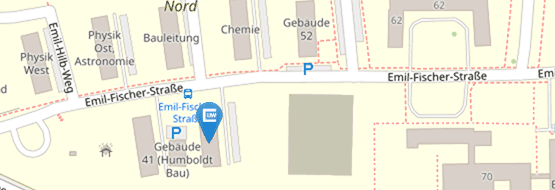Mathematical Data Science (Master)
Master's programme in Mathematical Data Science
| Degree: | Master of Science |
| Target duration: | 4 Semester |
| Academic term: | Summer and winter semester (starting winter semester 2025/2026) |
| Admission: | Free admission, but subject-specific admission requirements |
| Credits: | 120 ECTS points |
| Target group: | Successful graduates of a bachelor's degree programme in Mathematical Data Science, Computational Mathematics or Mathematics with special interest in data sciences |
| Qualification targets: | Qualification targets Master Mathematical Data Science (120 ECTS) |
| Accreditation: | will follow by internal accreditation during winter semester 2025/2026 |
Prospective graduates of Mathematical Data Science should
- deepen their knowledge of various sub-areas of mathematics and computer sciences as well as their relevance to data scientific applications,
- acquire insights into interdisciplinary aspects and get a sound knowledge of mathematical methods for analyzing and developing new data science techniques,
- further develop problem-solving strategies and skills,
- acquire comprehensive knowledge of artificial intelligence and machine learning,
- sharpen their ability to independently structure complex relationships and apply mathematical methods and algorithms to data science problems.
A study of Mathematical Data Science promotes the
- ability to think abstractly and address complex issues,
- perseverance and creativity in solving problems,
- knowledge and skills to implement mathematical methods algorithmically and to apply them to practical problems,
- willingness to work in interdisciplinary teams.
The Bavarian Higher Education Act (BayHSchG) requires a "special qualification" for enrolling in a master's degree programme.
For the master's programme Mathematical Data Science at the University of Würzburg, substantive requirements are set:
- Bachelor's Degree, e.g., in Mathematical Data Science, Computational Mathematics, or Mathematics with 180 ECTS points or a comparable degree programme,
- Competences amounting to at least 45 ECTS credits in the following sub-areas of mathematics: calculus (differential and integral calculus in one and more variables), ordinary differential equations, partial differential equations, nonlinear dynamics, vector analysis, function theory, linear algebra, algebra, geometry, discrete mathematics, functional analysis, stochastics,
- Competences amounting to at least 55 ECTS credits in the above-mentioned or other areas of mathematics or computer science.
To enable an uninterrupted transition from undergraduate to postgraduate study, a "conditional" admission can be applied, provided that one of the degrees mentioned in point 1 above can be used to prove the acquisition of 150 ECTS credits. The requirements mentioned from 2 and 3 must be achieved in any case. For a final admission to the master's degree programme in Mathematical Data Science, the requirements listed in 1 must be submitted before the end of the registration deadline for the third semester.
Deadlines
The following deadlines must be met:
- Until July 15 (if applying for the winter semester) or until January 15 (if applying for the summer semester), an online application must be submitted under WueStudy. JMU students can use their JMU account, external applicants must first register for an applicant account. (Since December 9, 2021, the online application will no longer be made on the JMU Master's portal.)
- Until September 15 (if applying for the winter semester) or until March 15 (if applying for the summer semester), proof of first degree or proof of performance can be submitted later.
Attention: application for a semester after the deadlines July 15 and 15 January, respectively, is not possible. On the other hand, documents can be submitted by the second specified deadlines. After receiving your online application on the Master-Portal, we will contact you by e-mail and let you know the status of your application.
Information and contact
For questions about the aptitude procedure, the study programme advisors for Mathematical Data Science are available. Once per semester, there will be an information session of the study counseling, which is held before the application deadlines.
Mathematicians generally have brilliant career prospects, regardless of the economic situation. In recent years, there have been increasing numbers of jobs being advertised in the area of data science, with particular focus on working with "big data" and artificial intelligence. In this programme you will acquire skills in the development and algorithmic implementation of methods to process data and to efficiently extract information from data. A master's degree in Mathematical Data Science certifies that graduates have the typical skills trained in mathematical courses such as
- to be able to quickly familiarize yourself with complex contexts,
- structured thinking,
- to identify the core of a problem,
- to find creative solutions,
- to use profound mathematical expertise.
In addition, the Mathematical Data Science degree programme focuses on working with data which is of great importance in most modern professional fields. Mathematical training with a focus on applied mathematics and coupled with knowledge of the basics of computer science results in a ticket to a crisis-proof job.
Structure
The master's degree programme in Mathematical Data Science is divided into modules. Each module ends with a module examination. Credit points (ECTS) are awarded for passed examinations (not to be confused with grades), which correspond to a workload of around 30 hours each. The modules are divided into
- a compulsory area (15 ECTS),
- the mandatory elective areas Optimization (10-20 ECTS), Applied Mathematics (20-40 ECTS), Mathematics (0-20 ECTS), Seminars and Workshops (10-30 ECTS), and Computer Science (15-35 ECTS), as well as
- the final degree (30 ECTS).
Control test
A control examination does not exist in this master's programme.
Degree
If you have earned 120 ECTS credits under the examination regulations, you will receive the academic degree Master of Science.
Study and examination regulations
- General academic and examination regulations (ASPO)
- Subject-specific provisions for the master's programme Mathematical Data Science (FSB; in german language only)
Among other things, the examination board is responsible for
- recognition questions at the beginning of the degree programme for achievements acquired in previous study programmes or at another study location,
- recognition questions in the current degree programme,
- equal opportunities issues.
The compulsory area in the master's programme in Mathematical Data Science consists of the mathematics module Mathematical Data Science and Machine Learning (10 ECTS) and the computer science module Machine Learning (5 ECTS).
The mandatory elective area (75 ECTS) is divided into the following five sub-areas:
-
Optimization (10-20 ECTS),
-
Applied Mathematics (20-40 ECTS),
-
Mathematics (0-20 ECTS),
-
Seminars and Workshops (10-30 ECTS), as well as
-
Computer Science (15-35 ECTS).
The final degree area consists of the master's thesis (30 ECTS).
A list of all possible modules can be found in the subject-specific provisions (in german language only) and in the module catalogue.
Find out about the current offer in the course catalog.
The master's thesis is the last major examination in your master's degree programme. This written work is intended to show that you are able to work on a problem (in the field of data science) in scientific depth within a set period of six months.
You can start your master’s thesis at any time.
At the very latest, you should start your master's thesis before the start of your 6th semester, so that you can use the full processing time to submit the work before the start of your 7th semester (at the beginning of the 7th semester, your master's programme is considered to be failed for the first time! ).
The topic of a master's thesis usually arises from a seminar or a working group. According to your mathematical interests (see overview of the chairs of the Institute of Mathematics), you should personally contact a lecturer in mathematics and define a topic directly with him/her (own suggestions are possible!). Potential supervisors are all lecturers in mathematics.
Once you have found a supervisor and a topic for your thesis, print out this form, fill in your details together with your supervisor and hand it to Ms. Schmid (Mathematik Ost, room 00.016). This will make the topic of your thesis and the date of submission (date of assignment of the topic + 6 months) official and binding.
Only in well-founded cases (such as, e.g., certified examination inability) the processing time can be extended upon application to the examination board and in consultation with the supervisor.
For regulations concerning passing the thesis to the university see here.
There is no colloquium for the master's thesis.






